Councilmember Kati Moulton hosted a town hall discussion on the future of the Jacobs Campus at Eureka City Hall this week. Photos by Andrew Goff.
###
Residents of Eureka’s Highland Park neighborhood filled city council chambers on Tuesday evening seeking answers about the impending sale of the long-blighted Jacobs Middle School campus. No such answers would be revealed. At least at the meeting, that is.
“Our purpose for this town hall is to talk about what we think should and shouldn’t happen at the old Jacobs campus site in Eureka’s Second Ward,” Councilmember Kati Moulton said during Tuesday’s town hall. “The future development of Eureka is a complicated machine with a lot of moving parts. Tonight we are really going to focus on just one very specific very important part, and that is what the people of Eureka want to see done with this 8.3-acre [site].”
The town hall was spurred by the Eureka City Unified School District’s recent decision to sell the Jacobs Campus. Last month, the school district’s board of trustees unanimously voted to exchange the Jacobs Campus to a mysterious private developer, known only as “AMG Communities-Jacobs, LLC,” for a small home on ⅛ acre lot, plus $5.35 million. The controversial decision put an abrupt end to years-long property negotiations between the school district and the California Highway Patrol, which had hoped to build its new headquarters on the site.
It remains unclear who exactly is behind AMG Communities-Jacobs, an LLC that was registered with the Secretary of State’s Office just two days before the land swap was approved by the school board. Some have speculated that proponents of the “Eureka Housing for All and Downtown Vitality” initiative or Security National President and CEO Rob Arkley, the initiative’s financial backer, could be behind the property exchange. Both parties have emphatically denied any involvement.
However, a recent report from the North Coast Journal identified a common thread between Arkley and AMG Communities. The NCJ obtained a copy of the property exchange agreement from Eureka City Schools that is signed by attorney Brad Johnson, the same attorney who filed lawsuits against the city on behalf of the Arkley-affiliated group Citizens for a Better Eureka.
We spotted Mike Munson, local business owner and proponent of the “Housing for All” initiative, at the meeting and asked if he knew anything about Johnson’s relationship with AMG Communities. Munson said he didn’t know who was behind AMG Communities, adding, “It’s just like a doctor, you know? They’re not going to talk to me about their other clients and I don’t know who they are [or] what their overall plan is for the property.”
Munson added that he’s “super excited to see with what the developer wants to do with the property.”
The “Frequently Asked Questions” section of the developer’s new website – thejacobscommunity.com – specifically addresses the question: “Is Rob Arkley an owner or investor in AMG Communities?” The website maintains that he is not.
AMG Communities refers to itself as “a single-purpose entity that was formed solely for the purpose of acquiring” the Jacobs Campus. “No firm plans have been developed yet,” the FAQ states. “The site, which is approximately 8.6 acres, is large enough to support a mix of housing and some neighborhood-serving commercial uses. The site will not be developed entirely into affordable housing. Any redevelopment plans will be formed with community input.”
If the sale of the property goes through, the developer can initiate a zoning change. Moulton emphasized that, in general, any zoning changes are subject to city council approval.
“The City of Eureka does not own [the property] … but what we can do is affect the zoning,” Moulton said. “And through the zoning, we can control [and] we can dictate what kinds of development are there.”
Another factor at play is the “Housing for All” initiative, which, if passed, would force the zoning change through an amendment to the city’s General Plan. The ballot measure seeks to rezone the Jacobs Campus, currently designated as “public facilities,” to accommodate single and multi-family housing.
Cristin Kenyon, the city’s Director of Development Services, noted that the initiative would rezone “at least 40 percent” of the site to high-density residential, which could result in as many as 44 dwelling units per acre.
“If you’re looking at 40 percent of the entire [11.4-acre] site, that would be 5.6 acres dedicated to high-density residential,” Kenyon said, adding that the pending property sale is for 8.3 acres. “Assuming that the ball fields will remain a public facility, 40 percent of the area being sold to the private developer would be 3.3 acres. Higher-density residential equates to 22 to 44 dwelling units per acre. On 3.3 acres, that would be somewhere between 73 and 145 new dwelling units.”
Residents discuss their hopes and dreams for the Jacobs site.
Following a staff’s presentation, meeting attendees were divvied up into large groups to discuss their concerns with the current state of the Jacobs site and how it could be improved.
The Outpost sat with a group of about 15 people who spoke in favor of more community-oriented development, such as a community center, a children’s park, or a dog park. They weren’t too crazy about the prospect of a housing development on the site, especially high-density housing. “It just wouldn’t fit in with the neighborhood,” one woman said.
Another woman in the group said she was disappointed that the CHP deal didn’t work out because it could have enhanced safety in the neighborhood. “Pardon my language, but I really think they got screwed,” she said. “I think the school district did them dirty.”
The rest of the audience had similar views on how the land ought to be used, with most folks advocating for community-oriented facilities and low-density housing in the neighborhood. One person thought it would be cool to build a planetarium on the property.
The conversation returned to the zoning issue during the Q&A period. One person asked if the city council would have the authority to change the zoning designation of the Jacobs Campus if the “Housing for All” initiative passes. For example, he asked, what if the site ended up unused like the Balloon Track? Moulton said the zoning overlay would remain in place “unless or until another ballot initiative removes it.”
Residents were asked why they attended the event and what they hoped to see on the Jacobs Campus site. Click the photos above and below to better read their responses.
Another resident expressed concern about the process surrounding the land exchange between the school district and CHP.
“This secret stuff bypassed all … four years of negotiations with CHP,” he said. “There’s the problem and that’s why we’re here, because of what [Eureka City] Schools did and the developer was able to do in private. No one to this day really knows.”
If there were any representatives of AMG Communities or Eureka City Schools in the audience, they didn’t make their presence known. AMG Communities emailed a statement to the Outpost shortly after Tuesday’s meeting:
We appreciate every member of the community who showed up to share their ideas for the future of the Jacobs site. We understand there are very strong opinions on the potential plans for the site, and want to be clear that we are listening and all want what is best for Eureka.
We are very early in this process, as the property is still in escrow. AMG Communities invites the community to engage with us in this process through both continuing to share their opinions and, if they’re interested, becoming a financial community partner. More information can be found on our website at thejacobscommunity.com
We are excited for the potential of this property, and all that it can bring and mean to the local community. We look forward to continuing this important dialogue as the process moves forward.
###
Councilmember Moulton takes questions from the audience
Supervisor Rex Bohn chats with Eureka City Councilmember Renee Contreras-DeLoach
Eureka Police Chief Brian Stephens stood in the hall to monitor the event
One resident, who opted not to show his face, had an idea for where Eureka could build housing
PREVIOUSLY:
- Who Will Get the Former Jacobs Campus? Bidders for Blighted Site in Highland Park Are the City of Eureka and California Highway Patrol, with a Decision Coming Soon
- The CHP Would Like to Build New Headquarters on Property Championed by People Opposing Downtown Housing Development, and There was a Meeting About it Yesterday
- Mystery Item on Tonight’s Eureka City Schools Agenda Suggests Imminent Action on Jacobs Campus, but the School District Won’t Share Details
- Eureka City Schools Board of Trustees Unanimously Votes for So-Called ‘Land Exchange’ with Mystery Developer
- The Eureka City Schools Board Voted on a Resolution Last Week That Was Not Published Before the Meeting. Is That Legal?
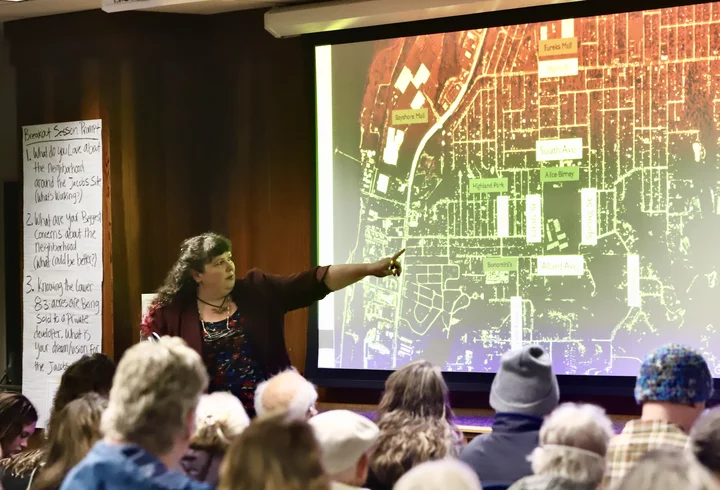
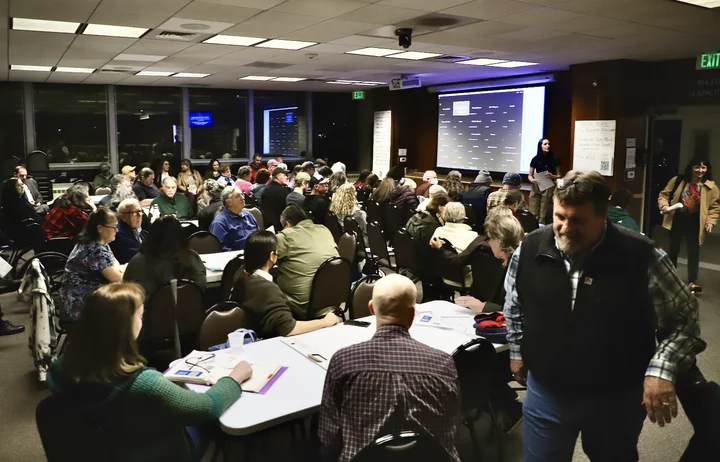
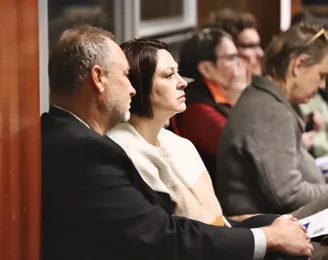
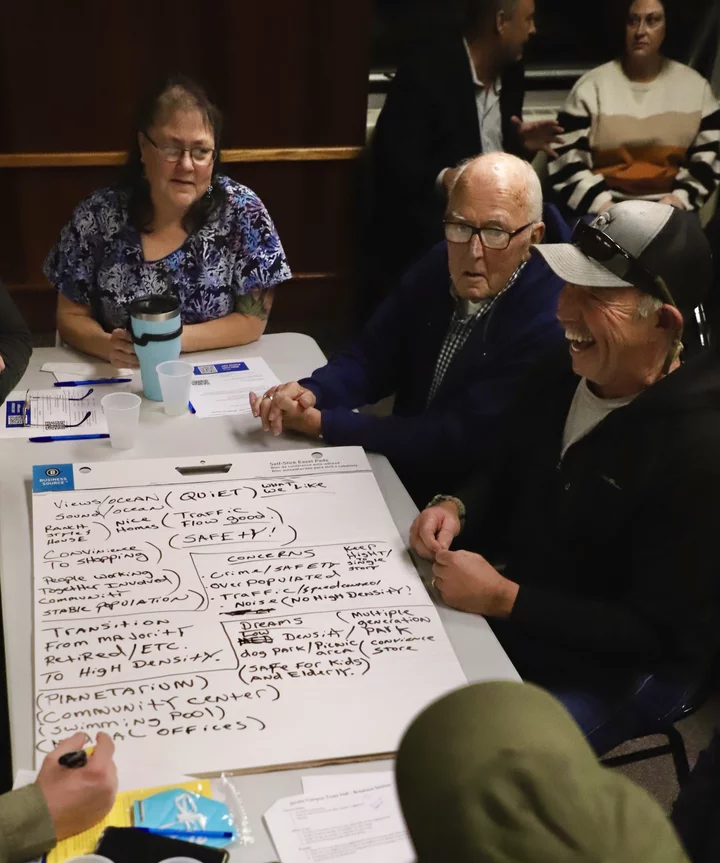
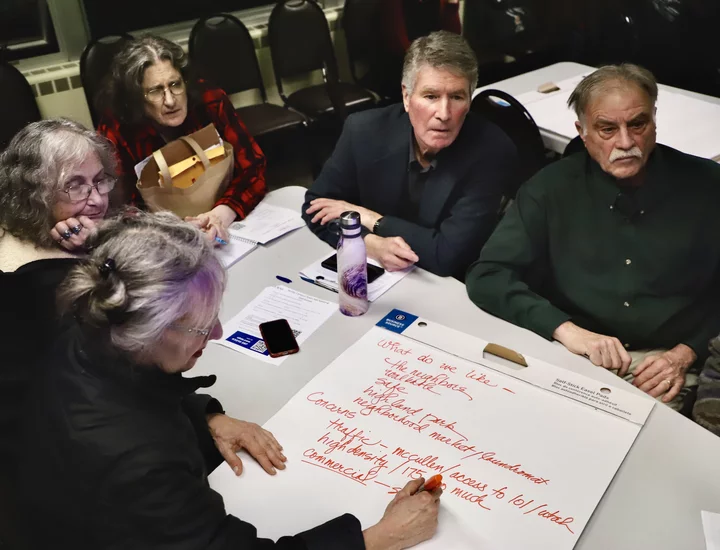
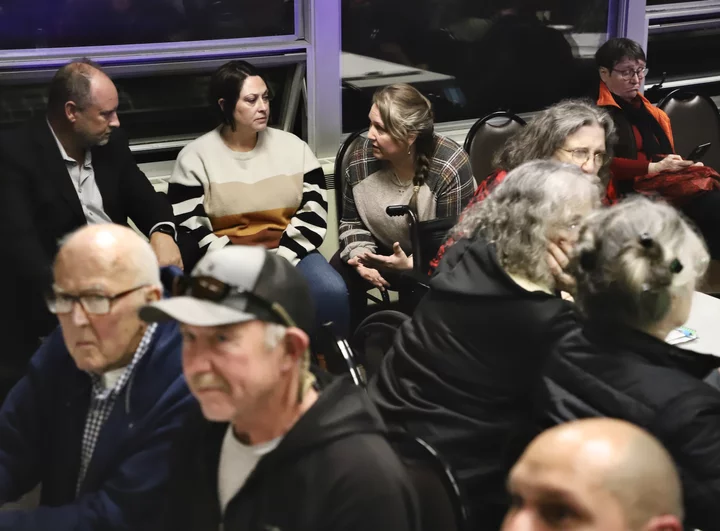
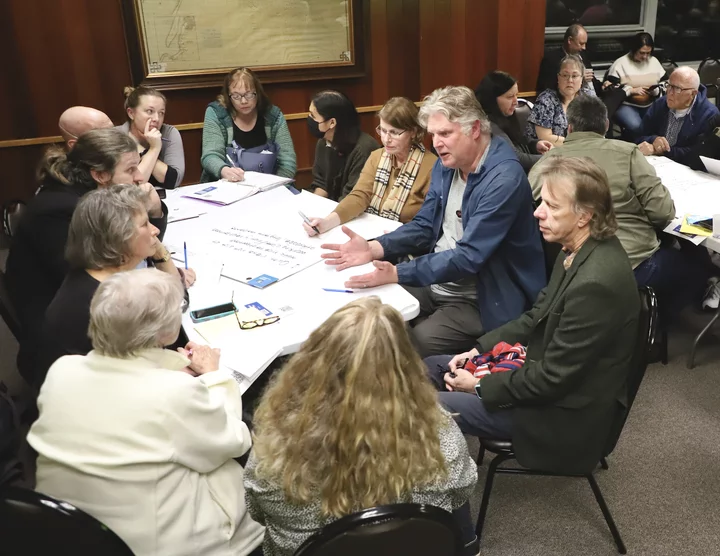
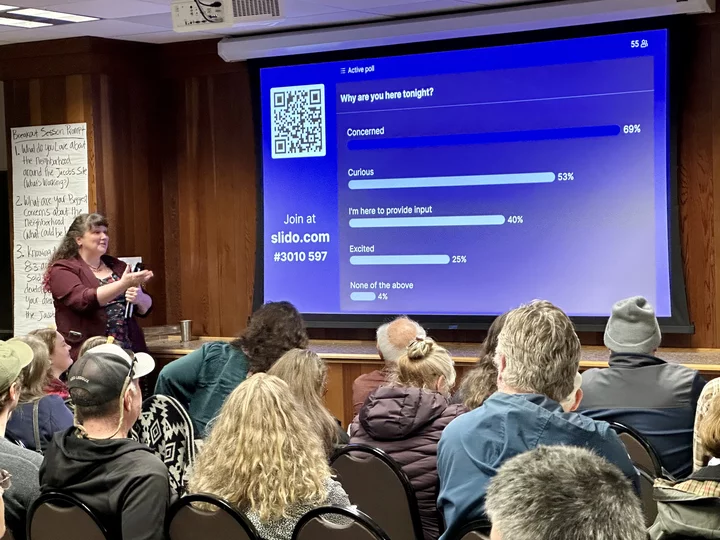
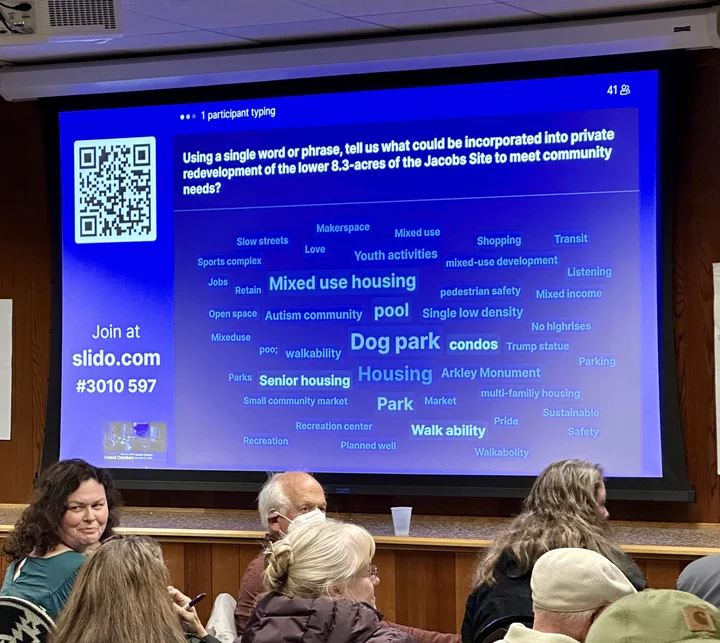
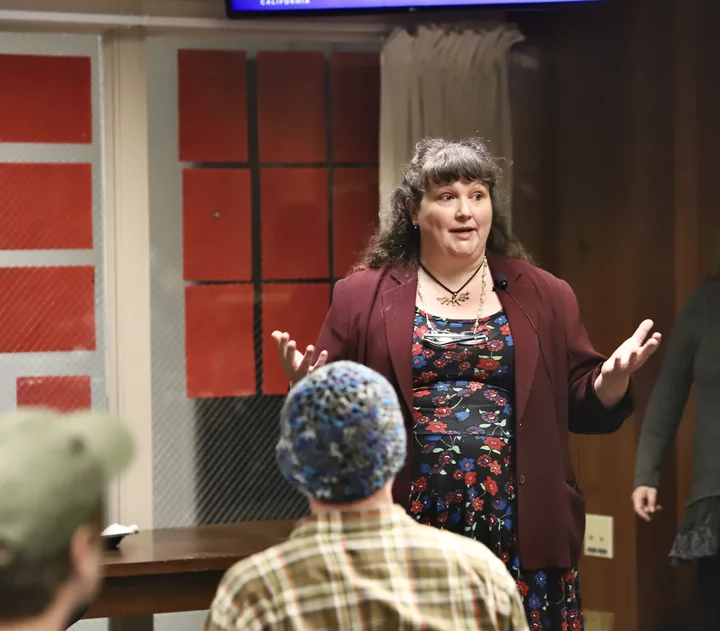
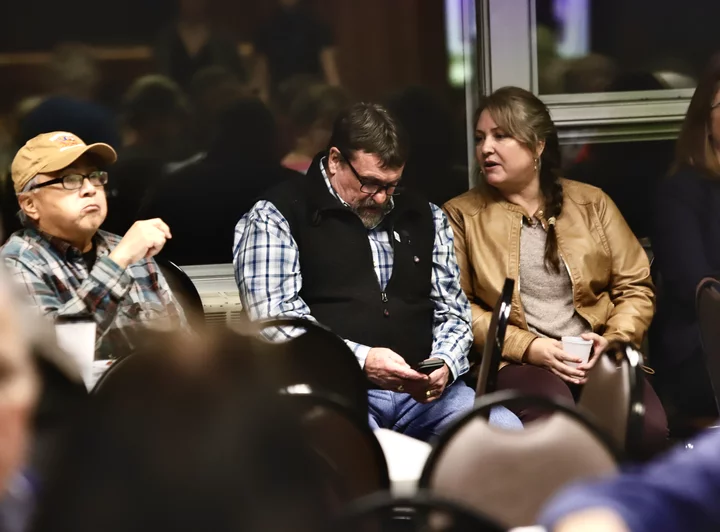

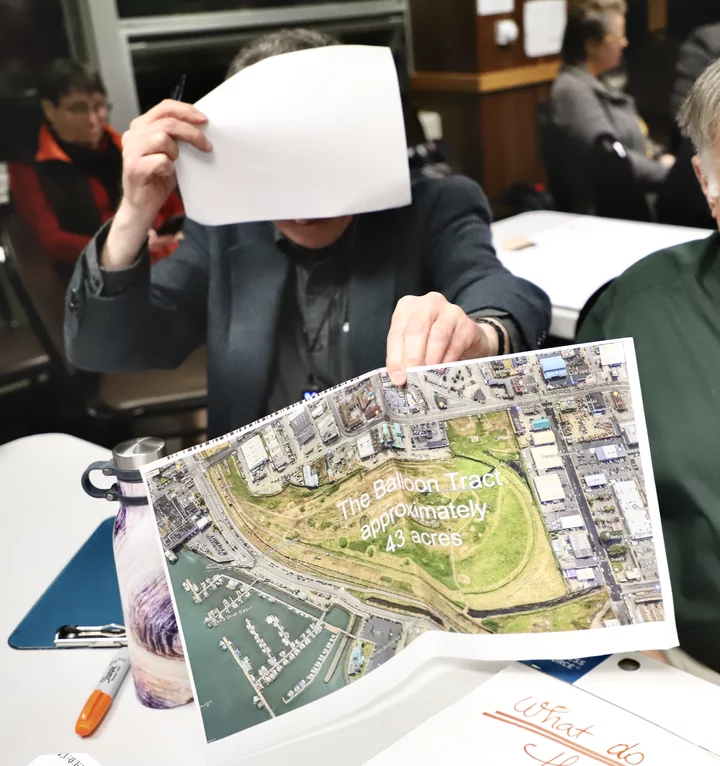
CLICK TO MANAGE